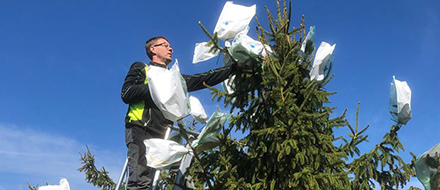
Södra is using controlled pollination to breed trees for tomorrow’s forests – a new innovation, where nearly 2 million seedlings are being propagated to produce trees that are healthier and more resilient, with 30% faster growth than trees in today’s forests. Source: Timberbiz
“This is a new method for seed production, and it feels fantastic that we will soon be able to offer spruce seedlings to forest owners that are more resilient to climate change,” said Göran Örlander, forestry strategist at Södra.
During the spring of 2019, Södra initiated a controlled pollination project in partnership with the Forestry Research Institute of Sweden. Female flowers of spruce with known traits were isolated to avoid pollination with male flowers with unknown traits. Pollen from the male flowers of selected trees with known traits was then hand sprayed onto the female flowers. The results were successful and in October, almost 70,000 spruce seeds were harvested.
“We have produced seeds with known and desirable traits, including fast growth, health and
straightness, but also properties that will make tomorrow’s trees more resilient to climate change,” said Mr Örlander.
Seedling production using the controlled pollination method will commence in spring 2020. About 10-20 stem cuttings will be taken from every seedling – all with the same positive genetic structure as the original seed. If all of the spruce seeds produce healthy and resilient seedlings, Södra will be able to sell 1-2 million cuttings with the most desirable traits available in a few years.
The controlled pollination project is a collaboration between Södra and the Forestry Research Institute of Sweden.
“We are delighted that the Forestry Research Institute is running such a successful breeding program. It will ensure wide genetic diversity in our plant breedin Örlander.
“This is an effective short cut to forest reproductive material with desirable traits. The seed produced by Södra are about 20 years ahead of their time, compared with conventional seed production methods. Moreover, this unique material will enable forest owners to increase their forest yields at a relatively low cost,” said Bo Karlsson, Head of Tree Breeding at the Forestry Research Institute of Sweden.
Södra’s fundamental mission is to promote the profitability of forest estates. This tree breeding initiative plays a key role in that mission and may also be the most decisive investment for achieving the sustainability target of 20% higher forest growth by 2050.
“We have to ensure a robust rate of forest growth, and healthy forest reproductive material that can help forests adapt to climate change is a critical part of that process. Achieving that goal is a core issue for all of Södra, and important for the entire Swedish forest industry” said Göran Örlander.g material,” said Mr Örlander.







